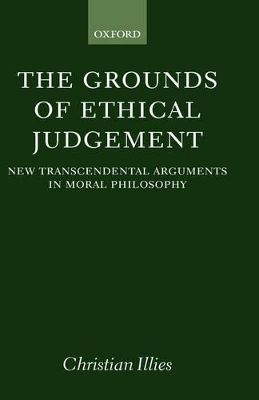
The Grounds of Ethical Judgement
New Transcendental Arguments in Moral Philosophy
Seiten
2003
Oxford University Press (Verlag)
978-0-19-823832-4 (ISBN)
Oxford University Press (Verlag)
978-0-19-823832-4 (ISBN)
Transcendental arguments have gained a lot of attention since the 1990s, mainly in the field of theoretical reason. Christian Illies argues that transcendental arguments have great potential in ethics, as they promise rational justification of normative judgements.
Transcendental arguments have gained a lot of attention over the past twenty years, mainly in the field of theoretical reason. Yet few scholars have looked at their relevance to practical reason. Christian Illies argues that although this methodological avenue is not yet well-paved, transcendental arguments have great potential in ethics, as they promise rational justification of normative judgements.
There are two main types of transcendental argument that have been developed for this purpose in recent years. One is based on an analysis of the implications of agency (mainly by Alan Gewirth), the other on an analysis of reason as a discursive process with normative presuppositions (Karl-Otto Apel and other continental philosophers, but also Onora O'Neill). Illies finds that these arguments have severe limitations, and argues that practical reason should involve a different analysis: judgement formation must be analysed as a form of agency. Once this starting point is secured, by showing that it cannot rationally be denied, then two things can be transcendentally inferred: first, that there exists a categorical demand upon agents to arrive at true judgements, and second, that we must respect freedom of agency in general. Here our ordinary notions of right and wrong find secure ground.
Compelling and original, The Grounds of Ethical Judgement offers ample evidence that transcendental arguments may provide long-sought foundations for morality.
Transcendental arguments have gained a lot of attention over the past twenty years, mainly in the field of theoretical reason. Yet few scholars have looked at their relevance to practical reason. Christian Illies argues that although this methodological avenue is not yet well-paved, transcendental arguments have great potential in ethics, as they promise rational justification of normative judgements.
There are two main types of transcendental argument that have been developed for this purpose in recent years. One is based on an analysis of the implications of agency (mainly by Alan Gewirth), the other on an analysis of reason as a discursive process with normative presuppositions (Karl-Otto Apel and other continental philosophers, but also Onora O'Neill). Illies finds that these arguments have severe limitations, and argues that practical reason should involve a different analysis: judgement formation must be analysed as a form of agency. Once this starting point is secured, by showing that it cannot rationally be denied, then two things can be transcendentally inferred: first, that there exists a categorical demand upon agents to arrive at true judgements, and second, that we must respect freedom of agency in general. Here our ordinary notions of right and wrong find secure ground.
Compelling and original, The Grounds of Ethical Judgement offers ample evidence that transcendental arguments may provide long-sought foundations for morality.
Preface ; 1. Claims and Counter-claims: A General Introduction to Moral Realism ; 2. The Promise of Transcendental Arguments ; 3. The Argument from Discourse ; 4. The Argument from Agency ; 5. The Argument from Normative Consistency and the Goodnes of Truth and Freedom ; 6. Truth and Beyond ; References ; Index
| Erscheint lt. Verlag | 1.8.2003 |
|---|---|
| Reihe/Serie | Oxford Philosophical Monographs |
| Verlagsort | Oxford |
| Sprache | englisch |
| Maße | 144 x 224 mm |
| Gewicht | 385 g |
| Themenwelt | Geisteswissenschaften ► Philosophie ► Erkenntnistheorie / Wissenschaftstheorie |
| Geisteswissenschaften ► Philosophie ► Ethik | |
| Geisteswissenschaften ► Philosophie ► Logik | |
| ISBN-10 | 0-19-823832-0 / 0198238320 |
| ISBN-13 | 978-0-19-823832-4 / 9780198238324 |
| Zustand | Neuware |
| Haben Sie eine Frage zum Produkt? |
Mehr entdecken
aus dem Bereich
aus dem Bereich
die Grundlegung der modernen Philosophie
Buch | Softcover (2023)
C.H.Beck (Verlag)
18,00 €
Buch | Softcover (2023)
Reclam, Philipp (Verlag)
7,00 €


![Was heißt Denken?. Vorlesung Wintersemester 1951/52. [Was bedeutet das alles?] - Martin Heidegger](/media/113619842)